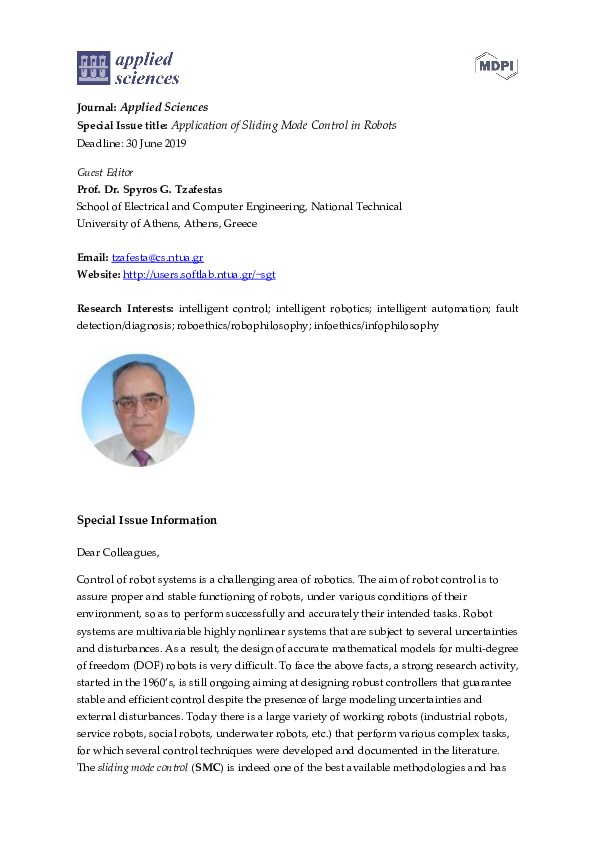Academia.edu no longer supports Internet Explorer.
To browse Academia.edu and the wider internet faster and more securely, please take a few seconds to upgrade your browser.
Special Issue title: Application of Sliding Mode Control in Robots
Special Issue title: Application of Sliding Mode Control in Robots
Related Papers
Proceedings of 12th IEEE International Symposium on Intelligent Control
Robot control using a sliding mode1997 •
Abstract: Control of robotic systems is vital due to wide range of their applications because this system is multi-input multi-output, nonlinear and uncertainty. Consequently, it is difficult to design accurately mathematical models for multiple degrees of freedoms robot manipulator. Therefore, strong mathematical tools used in new control methodologies to design a controller with acceptable performance. As it is obvious stability is the minimum requirement in any control system, however the proof of stability is not trivial especially in the case of nonlinear systems. One of the best nonlinear robust to control of robot manipulator is sliding mode controller. A review of sliding mode controller for robot manipulator will be investigated in this paper.
20th European Control Conference
Enhanced Variable-Gain Sliding Mode Control for Robot ManipulatorsRobotic manipulators must operate in complex scenarios, which make the overall operational space quite large, and the system dynamics within that space subject to significant variations and uncertainties. Sliding mode control (SMC) strategies have been successfully applied in this context, yet, if a worst-case approach is taken in the face of large operational variations, the resulting performance may happen to be suboptimal. Moreover, attention must be paid, in an industrial setting, to vibrations that may be induced on the robot joints by the presence of chattering induced by the SMC algorithm. This work tests, in a challenging application context, a recently-proposed r-order SMC strategy that encompasses both continuous and discrete adaptation strategies to adjust its parameters, giving rise to an overall switched approach. In particular, two realistic case studies of robot motion control are discussed, proving its effectiveness in enhancing both performance and robustness in complex operational scenarios.
Design a nonlinear controller for second order nonlinear uncertain dynamical systems is one of the most important challenging works. This course focuses on the design, implementation and analysis of a chattering free sliding mode controller for highly nonlinear dynamic PUMA robot manipulator and compare to computed torque controller, in presence of uncertainties. These simulation models are developed as a part of a software laboratory to support and enhance graduate/undergraduate robotics courses, nonlinear control courses and MATLAB/SIMULINK courses at research and development company (SSP Co.) research center, Shiraz, Iran.
International Journal of Robotics and Automation, 2 (5):265-282
Design and implementation of sliding mode algorithm: applied to robot manipulator-A review2011 •
Refer to the research, review of sliding mode controller is introduced and application to robot manipulator has proposed in order to design high performance nonlinear controller in the presence of uncertainties. Regarding to the positive points in sliding mode controller, fuzzy logic controller and adaptive method, the output in most of research have improved. Each method by adding to the previous algorithm has covered negative points. Obviously robot manipulator is nonlinear, and a number of parameters are uncertain, this research focuses on comparison between sliding mode algorithm which analyzed by many researcher. Sliding mode controller (SMC) is one of the nonlinear robust controllers which it can be used in uncertainty nonlinear dynamic systems. This nonlinear controller has two challenges namely nonlinear dynamic equivalent part and chattering phenomenon. A review of sliding mode controller for robot manipulator will be investigated in this research
International Journal of Industrial Electronics, Control and Optimization (IECO)
Model-Free Tracking Control via Adaptive Dynamic Sliding Mode Control With Application To Robotic SystemsIn this paper, a novel model-free control scheme is developed to enhance the tracking performance of robotic systems based on an adaptive dynamic sliding mode control and voltage control strategy. In the voltage control strategy, actuator dynamics have not been excluded. In other words, instead of the applied torques to the robot joints, motor voltages are computed by the control law. First, a dynamic sliding mode control is designed for the robotic system. Then, to enhance the tracking performance of the system, an adaptive mechanism is developed and integrated with the dynamic sliding mode control. Since the lumped uncertainty is unknown in practical applications, the uncertainty upper bound is necessary in the design of the dynamic sliding mode controller. Hence, the lumped uncertainty is estimated by an adaptive law. The stability of the closed-loop system is proved based on the Lyapunov stability theorem. The simulation results demonstrate the superior performance of the proposed adaptive dynamic sliding mode control strategy.
IEE Proceedings - Control Theory and Applications
Sliding regime of a nonlinear robust controller for robot manipulators1999 •
RELATED PAPERS
Florida Keys History Center Occasional Papers No.1
The Diary of Henry A Patterson Recording a Visit to Key West Florida in 18432023 •
Harry Potter. Fenomen społeczny – zjawisko literackie – ikona popkultury, red. W. Kostecka i M. Skowera, Wydawnictwo SBP, Warszawa
Analizy – interpretacje – polemiki. Harry Potter w polskim dyskursie naukowym2014 •
2017 •
Yobe Journal of Educational Studies
HUMAN RESOURCE DEVELOPMENT AS A CATALYST FOR EFFECTIVE EDUCATIONAL ADMINISTRATION2024 •
QJM: An International Journal of Medicine
Reliability of Plasma Von Willebrand Factor Antigen in Prediction of Oesophageal Varices in Pediatric and Adolescent Patients with Portal Hypertension2021 •
ACTA OF FISHERIES AND AQUATIC RESSOURCES
CRONOLOGIA DA INVASÃO DO PEIXE-LEÃO Pterois spp. NO ATLÂNTICO OCIDENTALInternational Journal of Medical Sciences and Pharma Research
Maternal Malaria and the Risk of Subsequent Pregnancy Complicationsmuzealne marginalia
archeologiczne ślady XIX i XX wiecznej emigracji zarobkowej mieszkańsców bocheńszczyzny na przykładzie materiałów ze stanowiska nr 9 w stanisławicach2022 •
Revista Escena
Estética de la teatralidad judicial en procesos de justicia transicional en cortes locales2024 •
2010 •


 spyros G tzafestas
spyros G tzafestas